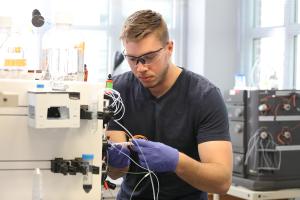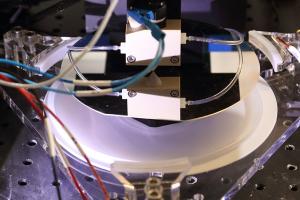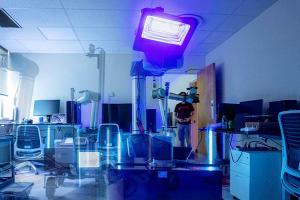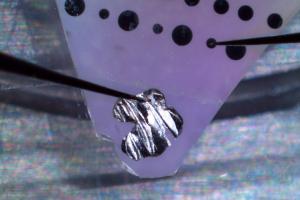Research @ UVA Engineering
Engineering for a Sustainable FutureEngineering a better future will require the best work of researchers collaborating along the spectrum from the tiniest building blocks of materials through the complex workings of entire societal systems. We work at the micro- and nano-scale in fields like heat transfer, catalysis and 2-D materials to identify fundamental properties of matter. Our goal is not simply to conduct research, but to pursue research with positive global impact.
-

Artificial Intelligence
Computer Science Our department is advancing the state of the art in both fundamental algorithms as well as new algorithms to help users benefit from this revolution and provide new capabilities for the benefit of society. -
Biomaterials, Tissue Regeneration and Advanced Biomanufacturing
Biomedical Engineering we push the boundaries through the development, optimization, and implementation of new and exciting chemistry, biology, and advanced biomanufacturing technology. Our ultimate goal is to control and replicate cells and tissues with the same precision and function as is found in nature, in order to provide greater translational therapies. -
Biomechanics and Mechanobiology
Biomedical Engineering Advances in biomechanics are revolutionizing our understanding of fibrotic, orthopedic, and cardiovascular diseases. At UVA, we're providing new strategies for tissue engineering, improving sports medicine and rehabilitation, advancing the goal of targeted drug delivery, and evolving to include the study and treatment of infectious disease. -

Biomedical Systems and Data Science
Electrical and Computer Engineering Our interdisciplinary research ranges from designing biomolecular sensors to developing data-intensive approaches for ensuring the safety of medical devices. -

Biotechnology and Biomolecular Engineering
Chemical Engineering Chemical engineers employ biotechnology for chromatography research, enhancing techniques to purify biomolecules, eliminate pollutants, facilitate neural tissue regeneration, and advance personalized medicine. They also study cell signaling and behavior. -

Built Environment
Civil and Environmental Engineering Civil and environmental engineers design, build, and maintain the built environment, i.e., the roads, buildings, drinking water facilities, and other infrastructure systems that serve society. -

Computer Systems
Computer Science Our expertise spans architecture, operating systems, and compilers, delving deep into the dynamic worlds of real-time, embedded, and mobile systems. -

Corrosion and Electrochemistry
Materials Science and Engineering Our corrosion and electrochemistry research tackles real-world issues that resist easy solutions. -

Cyber-Physical and Autonomous Systems
Mechanical and Aerospace Engineering We are taking a national leadership role in the area of underwater, ground-based and aerial autonomous systems, bio-inspired systems, robotics, sensing, and autonomous vehicles. We are able to leverage our state-of-the-art facilities in mechatronics rapid prototyping as well as cyber-physical systems and manufacturing with our strong industrial ties. -

Cyber-Physical System Networks and I.o.T
Computer Science Cyber-Physical Systems (CPS) and the Internet of Things have been identified by the National Academy of Sciences as national research priorities, critical to educating scientists and engineers for an increasingly cyber-enabled future. -

Devices and Circuits
Electrical and Computer Engineering We excel in the design of THz devices and circuits, microelectromechanical components, super-conducting materials, and beyond-CMOS electronics. -

Electrical Magnetic Optical Properties
Materials Science and Engineering Our research in electrical, magnetic and optical properties of materials makes modern computation and communication possible.